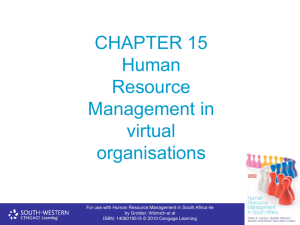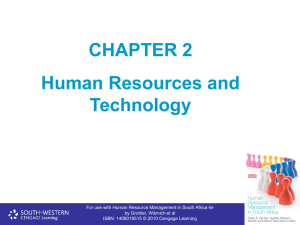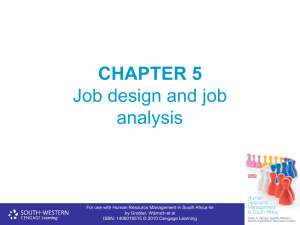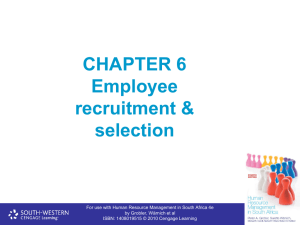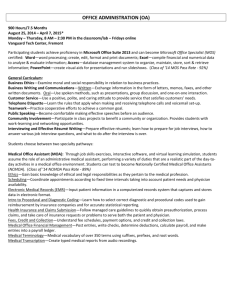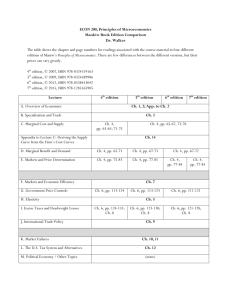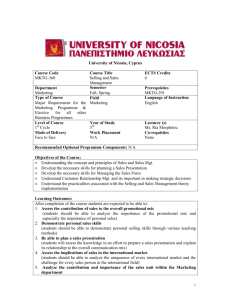File
advertisement
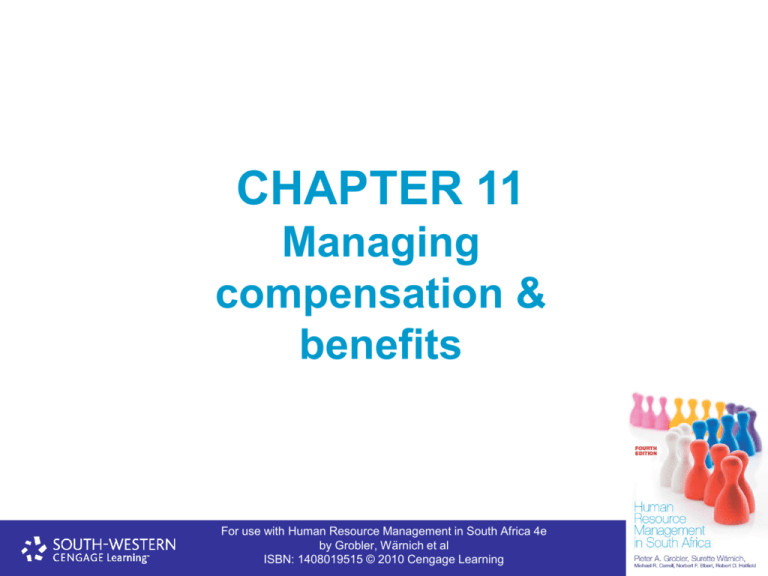
CHAPTER 11 Managing compensation & benefits For use with Human Resource Management in South Africa 4e by Grobler, Wärnich et al ISBN: 1408019515 © 2010 Cengage Learning Chapter outcomes • Explain the link between pay, motivation and performance • Define job evaluation and discuss four popular methods of performing it • Develop a time-based pay system using pay grades and steps • Discuss three types of individual incentives • Discuss why gainsharing, profitsharing and employee stock ownership plans (ESOPs) have grown as organisational incentive plans • Understand executive compensation methods • Understand the growth of employee benefits and their organisational objectives For use with Human Resource Management in South Africa 4e by Grobler, Wärnich et al ISBN: 1408019515 © 2010 Cengage Learning Definitions • Compensation often used interchangeably with wage and salary administration • Compensation is a broader concept • Compensation/total rewards refers not only to extrinsic rewards such as salary and benefits, but also to intrinsic rewards such as achieving personal goals, autonomy and more challenging job opportunities • Wage and salary administration usually refers strictly to the monetary rewards given to employees For use with Human Resource Management in South Africa 4e by Grobler, Wärnich et al ISBN: 1408019515 © 2010 Cengage Learning Monetary rewards (Direct payments) Extrinsic rewards Compensation of employees (Financial) Benefits (Indirect payments) Hourly wage Salary Bonuses Commissions Pay incentives Skills-based/competencybased Insurance Retirement Paid holidays Paid public holidays Food services Medical Recreation Recognition Promotion opportunities (Non-financial) Working conditions Interesting work For use with Human Resource Management in South Africa 4eopportunities Training Intrinsic rewards by Grobler, Wärnich et al ISBN: 1408019515 © 2010 Cengage Learning Compensation objectives • • • • Attracting good/talented employees Retaining good/talented employees Motivation Legal considerations For use with Human Resource Management in South Africa 4e by Grobler, Wärnich et al ISBN: 1408019515 © 2010 Cengage Learning Objectives of a compensation system 1. Attract good/talented applicants Wage survey to determine the “going rate” in the labour market 2. Retain good/talented applicants Job evaluation system that employees perceive as “equitable” 3. Motivate employees Reward good performance Documentation of HR records 4. Comply with the law Government legislation For use with Human Resource Management in South Africa 4e by Grobler, Wärnich et al ISBN: 1408019515 © 2010 Cengage Learning Motivation and performance model Feedback to employee Employee sets expectations and goals Employee performs job Performance is evaluated Rewards are given Employee considers equity of performance rewards Employee sets new goals and expectations based on prior experiences For use with Human Resource Management in South Africa 4e by Grobler, Wärnich et al ISBN: 1408019515 © 2010 Cengage Learning For use with Human Resource Management in South Africa 4e by Grobler, Wärnich et al ISBN: 1408019515 © 2010 Cengage Learning Job evaluation (JE) • Process of systematically analysing jobs to determine the relative worth of jobs within the organisation that results in an organisation’s pay system • Result is a pay system with pay rates for each job depending on the status of the job according to the hierarchy • Does NOT review the employees in the job but the worth of the position For use with Human Resource Management in South Africa 4e by Grobler, Wärnich et al ISBN: 1408019515 © 2010 Cengage Learning Job evaluation (JE) (continued) • JE methods: – Job ranking – Factor comparison – Classification method – Point method – Patterson method – Hay method – TASK – Peromnes For use with Human Resource Management in South Africa 4e by Grobler, Wärnich et al ISBN: 1408019515 © 2010 Cengage Learning Job evaluation (JE) (continued) • Job evaluation committee • Outside assistance For use with Human Resource Management in South Africa 4e by Grobler, Wärnich et al ISBN: 1408019515 © 2010 Cengage Learning Pay systems • Time-based systems • Person-based systems • Performance-based systems For use with Human Resource Management in South Africa 4e by Grobler, Wärnich et al ISBN: 1408019515 © 2010 Cengage Learning Guidelines for incentive plans • • • • • Bold incentives Emphasis on team performance Quick feedback Above-average base Simple formula For use with Human Resource Management in South Africa 4e by Grobler, Wärnich et al ISBN: 1408019515 © 2010 Cengage Learning Incentive plans • Problems with incentive plans • Different types: – Cash profit-sharing – Stock ownership or options – Business incentives – Productivity/gain-sharing – Team/group incentives – Individual performance awards – Special recognition awards For use with Human Resource Management in South Africa 4e by Grobler, Wärnich et al ISBN: 1408019515 © 2010 Cengage Learning Executive compensation • 4 forms of pay: – (1) Base salary – (2) Annual bonus – (3) Long-term incentives – (4) Benefits and perquisites (“perks”) • Golden parachutes • Stock options For use with Human Resource Management in South Africa 4e by Grobler, Wärnich et al ISBN: 1408019515 © 2010 Cengage Learning Benefits • Types of benefits • Benefits required by law: – Unemployment insurance – Compensation for injuries and diseases • Voluntary benefits • Paid time off • Insurance • Employee services For use with Human Resource Management in South Africa 4e by Grobler, Wärnich et al ISBN: 1408019515 © 2010 Cengage Learning Total benefit planning • Flexible benefit plans – Cafeteria plan – Buffet plan – Alternative dinners plan For use with Human Resource Management in South Africa 4e by Grobler, Wärnich et al ISBN: 1408019515 © 2010 Cengage Learning Advantages of flexible plans • • • • • • Meet diverse needs of employees Control benefit costs Improve benefits offered Attract and retain employees Avoid unions Avoid duplicate coverage For use with Human Resource Management in South Africa 4e by Grobler, Wärnich et al ISBN: 1408019515 © 2010 Cengage Learning Summary • • • • Organisations use both extrinsic and intrinsic rewards to compensate employees for their time and effort. Pay systems are designed to attract, retain and motivate employees while complying with government legislation. Job evaluation is used to evaluate jobs systematically and to assign them to pay grades. The HR specialist strives to maintain a pay system that employees view as equitable, both internally and externally. Standard methods of evaluation include ranking, classification, point and factor comparison. Each offers different advantages. Pay systems are usually designed to compensate people for the amount of work they produce (piecework), the skills they learn and use or the time they spend on the job (hourly and salaried). Most employees in South Africa are paid through time-based systems. Individual employee, team-based and organisationwide systems, such as profit-sharing and gainsharing, are replacing automatic pay increases to relate pay to performance. For use with Human Resource Management in South Africa 4e by Grobler, Wärnich et al ISBN: 1408019515 © 2010 Cengage Learning Summary • • • • Executive compensation has become a complex area of HR functions. Top executives often receive compensation in as many as four areas, including salary, bonuses, long-term incentives and benefits. Employee benefits are not just a fringe cost to employers; they represent a substantial percentage of the total payroll. Benefits are usually awarded to all workers or on a seniority basis. Certain benefits are required by law, including unemployment insurance and compensation for injuries and diseases. Retirement income is provided through private/government pension plans and personal savings. Employers believe that they directly or indirectly provide all these sources - which constitute the single most expensive benefit area. For use with Human Resource Management in South Africa 4e by Grobler, Wärnich et al ISBN: 1408019515 © 2010 Cengage Learning Summary • • • • Health insurance programmes provided by employers have expanded to include life/disability insurance, as well as the traditional medical and hospitalisation coverage. Paid time off from work represents a major benefit cost. Flexible benefit plans are of great interest to employers because they help contain benefit costs and provide employees with more individualised benefit programmes. Changing employee demographics have caused employers to offer childcare programmes to help employees meet their family needs. For use with Human Resource Management in South Africa 4e by Grobler, Wärnich et al ISBN: 1408019515 © 2010 Cengage Learning
